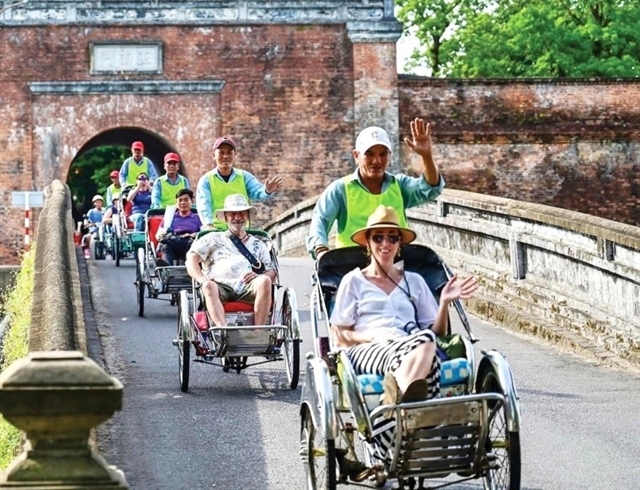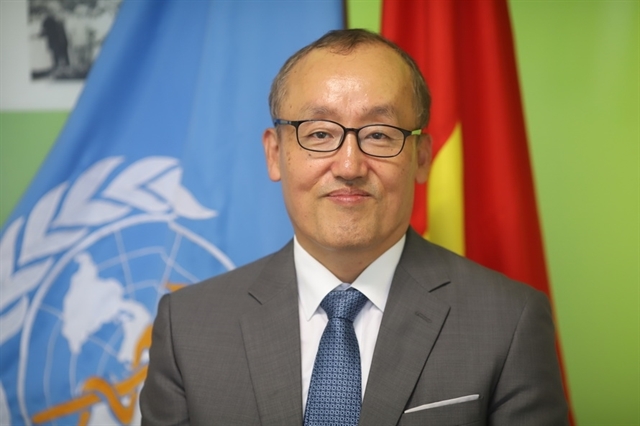 Society
Society

Dr Kidong Park, Representative of the World Health Organisation (WHO) in Việt Nam, has made recommendations for the country on COVID-19 prevention and control in the fourth wave of outbreaks, in which he emphasised vaccinations and affirmed that the organisation will accompany Việt Nam.

|
| Dr. Kidong Park, WHO Representative in Vietnam. — Photo courtesy of WHO |
Dr Kidong Park, Representative of the World Health Organization (WHO) in Việt Nam, has made recommendations for the country on COVID-19 prevention and control in the fourth wave of the outbreak, in which he emphasised vaccinations and affirmed that the organisation will accompany Việt Nam during a recent interview granted to Vietnamese media.
What is the efficacy of COVID-19 vaccines approved in the WHO Emergency Use Listing (EUL) against the Delta variant?
To date, at least 17 vaccine products have been deployed of which seven vaccine products have been approved by WHO EUL procedures.
These are vaccines developed by Pfizer/BioNTech, AstraZeneca/Oxford, AstraZeneca/Serum Institute India, Janssen, Moderna, Sinopharm/BBIP and Sinovac.
WHO is closely monitoring the effectiveness of these vaccines in the real world, including the impact of variants of concern on vaccine effectiveness.
Available data as of August 6, 2021 indicates that these vaccines are still effective in preventing severe COVID-19 against the Delta variant though effectiveness in preventing symptomatic disease seems reduced.
WHO's message is clear that when it is your turn to get vaccinated, take the vaccine available to you. It protects you and the people around you. It also reduces the chance of further circulation of the Delta variant and emergence of other variants.
What about the Sinopharm vaccine, can it provide protection against the Delta variant?
During the EUL process, WHO assessed the efficacy, safety and quality of the Sinopharm vaccine. A large multi-country phase 3 trial has shown two doses of Sinopharm vaccine administered at an interval of 21 days have an efficacy of 79 per cent against symptomatic SARS-CoV-2 infection 14 or more days after the second dose.
WHO concluded that the known benefits of the Sinopharm vaccine outweigh the risks that are known or considered possible.
WHO currently recommends the use of the Sinopharm vaccine according to the WHO Prioritisation Roadmap, even if variants are present in the country.
There are currently opinions about vaccines that are “better” and “more efficacious” compared to the others. What are WHO's recommendations on this issue?
All the vaccines that have achieved WHO EUL have met criteria of efficacy, safety and quality set by WHO through extensive consultation of international experts. They are highly effective in preventing severe disease and hospitalisation due to COVID-19.
We will update our recommendations if needed.
Why should we be concerned about the Delta variant?
WHO is closely monitoring the emergence of new variants and their characteristics such as transmissibility and disease severity as well as their impacts on diagnostics and vaccines.
The Delta variant is a variant of concern that WHO is tracking and monitoring around the world.
Available data as of 6 August 2021 indicates that the Delta variant shows increased transmissibility and increased risk of hospitalisation. Delta variant is now reported in 135 countries, including Việt Nam. It has become the dominant variant in many countries.
There are ways to fight the Delta variant:
First, continue to practise 5K: wear mask consistently, be in ventilated spaces, practise hand hygiene and respiratory etiquette, avoid crowding and fill out health declaration.
Second, get vaccinated when it is your turn, with the vaccine available to you. Vaccines continue to be protective against severe disease and death when faced with the Delta variant.
What is WHO's assessment about the implementation of vaccination in Việt Nam? Is it effective? What more needs to be done?
WHO commends the Government’s highest level commitment to COVID-19 vaccination. WHO’s global targets are to vaccinate at least 10 per cent of the population of every country by September 2021, at least 40 per cent by the end of 2021, and 70 per cent globally by the middle of 2022. These are the critical milestones we must reach together to end the pandemic.
Many countries are facing difficulty to secure sufficient vaccines, not only Việt Nam. WHO acknowledges that the Government of Việt Nam has made maximum effort day and night for supplying vaccines to save the citizens.
Now more vaccines are arriving in the country, which is good news.
All the provinces, districts and communes should speed up their vaccination roll out activities so as to achieve the goal set by the Government and recommended by WHO.
WHO appreciates every single personnel working so hard for this unprecedented vaccination campaign. WHO recommends giving priority to healthcare workers, frontline workers and people who are at higher risk of severe diseases and death -- the elderly, and people with comorbidities.
There are several vaccine products available in the country. New types of vaccines will be available in the near future.
I want to remind you that safe and effective vaccines are critical to ending the COVID-19 pandemic but they are not a ‘silver bullet’. Vaccines alone won't stop the community transmission. We should continue to apply 5K. These measures still continue to be extremely important, even if you are vaccinated, especially in provinces with ongoing community transmission.
What is WHO's assessment about the outbreak prevention and control of Việt Nam in this fourth wave? What should Việt Nam focus on?
Just like many countries in the world, Việt Nam is now facing a very complicated and concerning outbreak situation. We observe high numbers of daily recorded cases and deaths over the past weeks, especially from HCM City and neighbouring provinces.
We also observe cases with unknown or unclear epidemiological links reported from many provinces besides HCM City. This trend is concerning as it indicates a very high risk of onwards community transmission.
A surge in number of severe cases and deaths is also expected given the increasing number of cases. Healthcare facilities in hotspot provinces are reported to be overwhelmed in responding to the current situation. So it is legitimate to say that the health system is currently under extreme pressure and the health workers are overstretched. However, we have also noted that the Government is making all efforts to combat this battle for the better.
The task ahead is enormous and the battle against the pandemic will be long and would demand massive resources.
WHO remains confident in the Government’s whole-of-society approach that has been led by the National Steering Committee from the beginning of this pandemic.
We are all in this together. It is not only the role of the Government and the health system to control this outbreak, it is everybody’s responsibility to ensure Việt Nam once again wins over the virus.
We remind the public that regardless of the variant, the same protective measures work. People need to continue to apply 5K. And if it is your turn, get vaccinated with the vaccine offered to you. These measures remain extremely important.VNS




